
| Past Issues/Subscribe | Advertise |
Disagreement Expressed at CARB’s SCR Workshop
Among those offering comments against change to SCR technology at a public workshop sponsored by the California Air Resources Board (CARB) and Environmental Protection Agency (EPA) were representatives from Volvo Powertrain, Cummins and Daimler Trucks North America (DTNA). At the start of the workshop, state and federal agencies indicated they were considering changes to rules governing SCR systems that might take effect as soon as Jan. 1, 2011. The workshop was held as part of an agreement with Navistar International to withdraw a suit over EPA and CARB rules governing SCR use. Navistar is the only U.S. diesel manufacturer that has chosen not to use SCR technology to meet strict NOx emissions restrictions that took effect Jan. 1. Manufacturers using SCR systems were particularly vocal about the agencies’ use of the workshop to settle a legal challenge by the one competitor that is not using the technology. The heart of the issue involves diesel emissions fluid (DEF), a urea-based liquid that is required by current SCR systems to bring NOx emissions below the 0.2 g/hp/hr. level required by 2010 emissions standards. In approving the use of SCR for 2010, EPA issued "guidance" on "inducement strategies" that would slowly de-rate engine power and eventually shut down a vehicle if it were to run out of DEF. Those rules were also adopted by CARB, which separately certifies diesel engine emissions for vehicles traveling within California. Navistar has charged that this is "a loophole" that would allow SCR-equipped trucks to exceed required NOx levels for periods that could exceed 1,000 miles. In a change of course, CARB and EPA seem to agree, stating in an announcement for the workshop that they expect "manufacturers to do a better job of assuring that vehicles are not allowed to operate out of compliance for significant periods of time." Calling its outlined changes "proposals, not final agency decisions" in its workshop presentation, CARB nevertheless said "most" EPA changes to SCR rules could take effect Jan. 1, 2011, and "most" CARB changes with model year 2011. Pointing out the current SCR strategies "were fully reviewed, approved and certified by both EPA and CARB," Volvo’s Steve Berry, director of government relations, said, "We have seen no evidence of DEF refill or SCR tampering issues in the field and believe it is premature to impose new restrictions in the absence of any evidence of need." Volvo was concerned the workshop and its proposed changes "were agreed to in the context of litigation with a non-SCR manufacturer, without any review by the regulated entity, the manufacturers of SCR-based products," Berry said. "We’re concerned about the precedent that’s being set by these proceedings, whereby the regulated provisions by which a technology is to be deemed acceptable for production are being driven by a competitor using alternative technology." Although DTNA "will not comment on technologies manufactured or actions taken by other companies," a spokesperson for the company said it has already built more than 3,000 Freightliner Cascadia trucks with EPA2010-compliant DD15 engines and has more than 2,000 of those trucks running in customer fleets. Not only does DTNA’s SCR system "operate as designed, meeting federal and state air quality standards that reduce particulate matter and nitrogen oxides to near-zero levels without the use of credits," said the spokesperson, but "DTNA testing and customer experiences also validate that DEF refilling inducements work to consistently and effectively keep each DTNA vehicle operating in compliance with 2010 emissions standards." Cummins has 15 engine families already certified by EPA and CARB with SCR, and has produced 12,000 emissions-compliant engines in the first half of 2010 for 63 North American vehicle manufacturers, according to Bob Jorgensen, executive director for product environmental management. "With 2011 only six months away, it is not feasible to make changes to these already-developed products without compromising quality," he said. "The use of SCR in meeting 2010 emissions regulations is the right technology," Jorgensen said. "This technology has simultaneously reduced NOx emissions and fuel consumption, offering a true cost-benefit to our customers. It is important that we all support the continued use of this technology without putting additional burden, cost or potential downtime on the services that these companies are providing to our nation." |

| calrental.org |



